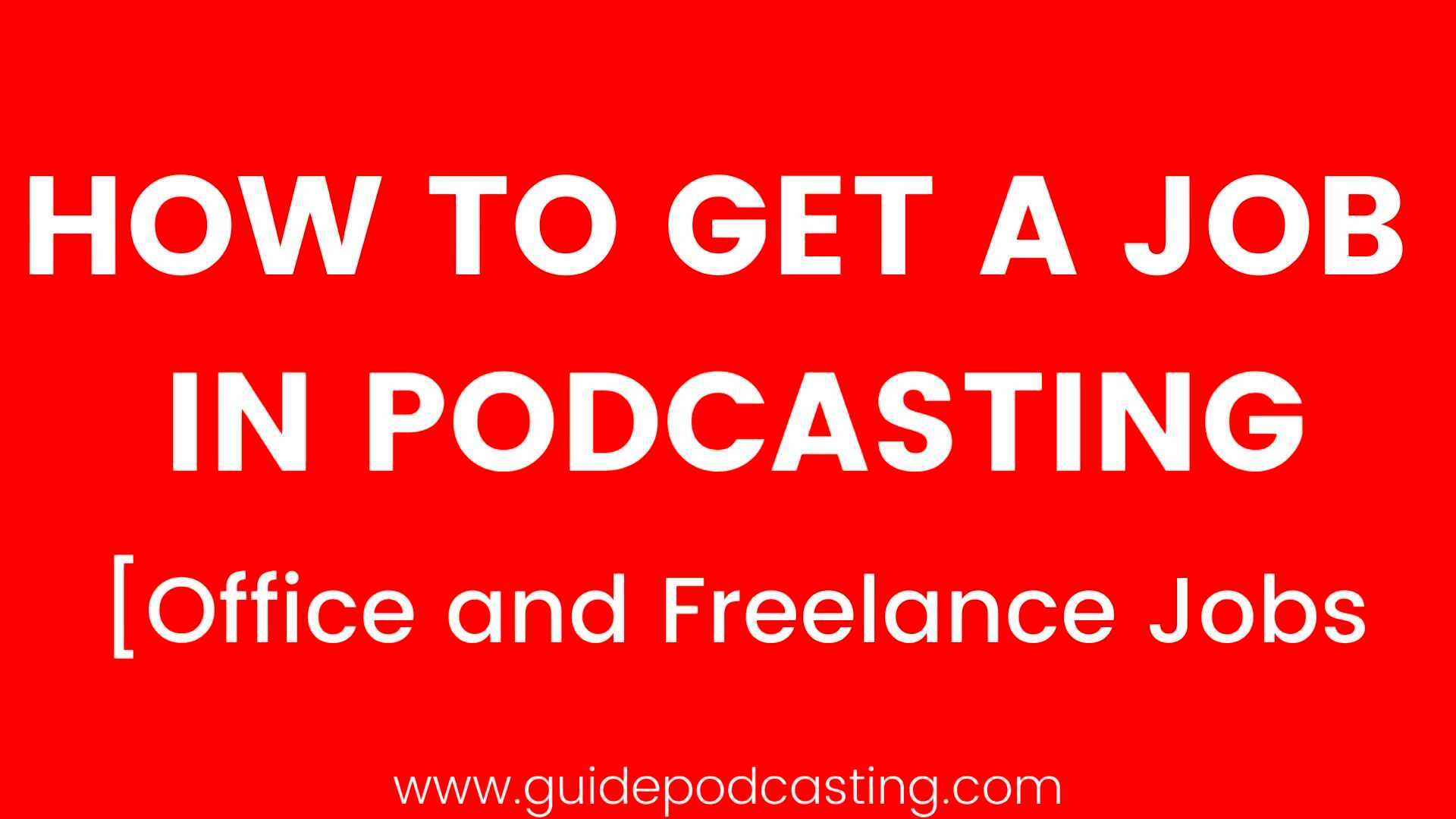Podcasting is becoming one of the most popular ways to communicate, educate, and entertain. As a freelance podcast host, you can tap into this growing market, offering your voice and skills to help brands and individuals connect with their audiences. Whether you’re experienced in public speaking or just passionate about a particular topic, podcasting gives you the chance to build your career around something you love. In this guide, we’ll explore how to start your career as a freelance podcast host and what steps you need to take to get started.
Why Podcast Hosting is a Growing Career Option

Podcasting is not just a trend anymore—it’s a thriving industry. With millions of listeners worldwide, the demand for fresh, engaging, and professional podcast content is at an all-time high. Here’s why podcast hosting is an attractive career choice:
- Accessible to All: You don’t need expensive degrees to get started. Anyone with a good voice and an interesting perspective can build an audience.
- Flexible Work Schedule: As a freelancer, you set your own hours and work from anywhere, giving you the freedom to balance work and personal life.
- Growing Demand for Podcasts: More businesses, influencers, and brands are using podcasts as a way to engage their audience and expand their reach.
- Potential for Passive Income: With a successful podcast, you can monetize your content through sponsorships, ads, and other opportunities.
As the popularity of podcasts continues to rise, becoming a freelance podcast host can be both fulfilling and profitable.
Also Read This: Why Aren’t My Images Showing Up on Fiverr?
Steps to Start Your Freelance Podcasting Journey

Starting your freelance podcasting career might seem daunting, but breaking it down into steps makes it manageable. Here’s how you can begin:
- Define Your Niche: Identify the topics that you are passionate about and knowledgeable in. Focusing on a specific niche will help you attract a dedicated audience.
- Invest in Quality Equipment: Good audio quality is essential for a successful podcast. Invest in a reliable microphone, headphones, and audio editing software.
- Create a Recording Space: Set up a quiet space where you can record without interruptions. This will help improve the sound quality and make your recordings more professional.
- Choose a Hosting Platform: Find a podcast hosting service where you can upload and distribute your episodes. Look for a platform that offers easy-to-use tools and good analytics.
- Start Recording and Editing: Record your first few episodes. Edit them to improve sound quality and remove mistakes. Practice makes perfect, so don’t worry if your first episodes aren’t flawless.
- Market Your Podcast: Share your episodes on social media, create a website, and engage with your audience. The more you promote your podcast, the more likely it is to gain listeners.
- Monetize Your Podcast: Once you have a steady audience, explore ways to earn money. This could be through sponsorships, affiliate marketing, or offering premium content.
Starting your freelance podcasting journey is a process that requires time and effort, but with persistence, you can turn your passion into a profitable career.
Also Read This: What You Can Sell on Fiverr: A Comprehensive Guide
Choosing the Right Equipment and Software for Podcast Hosting

To create a professional podcast, it’s essential to have the right equipment and software. Good audio quality makes a big difference in how your listeners engage with your content. Below are some important tools you’ll need to get started:
- Microphone: A high-quality microphone is crucial for clear audio. Some popular options for podcasters include the Audio-Technica AT2020 or the Blue Yeti. Both are affordable yet produce excellent sound.
- Headphones: A good pair of closed-back headphones will help you monitor your audio while recording and editing. Look for comfort and sound isolation.
- Audio Interface: If you’re using an XLR microphone, you’ll need an audio interface, like the Focusrite Scarlett 2i2, to connect it to your computer.
- Podcasting Software: Recording and editing software are essential for creating polished episodes. Audacity is a popular free option, while Adobe Audition offers more advanced features.
- Hosting Platform: A podcast hosting service is where you’ll upload your episodes. Some reliable platforms include Buzzsprout, Podbean, and Libsyn. They allow you to distribute your podcast to various podcast directories like Apple Podcasts, Spotify, and Google Podcasts.
Investing in quality equipment and software will enhance your podcast’s sound and professionalism, helping you stand out in a crowded podcasting market.
Also Read This: How to Market Fiverr Gigs
Building Your Personal Brand as a Freelance Podcast Host
Your personal brand is what makes you unique and attracts listeners and clients to your podcasting services. As a freelance podcast host, you need to establish a brand that reflects your personality and expertise. Here’s how you can build a solid brand:
- Define Your Niche: Determine what sets you apart from other podcast hosts. What topics do you enjoy talking about? What is your perspective or angle on these topics? A clear niche will help you connect with a specific audience.
- Create a Memorable Name: Choose a name for your podcast that’s catchy and easy to remember. The name should reflect the themes you’ll be covering in your episodes.
- Develop a Consistent Style: Whether it’s your tone, music, or the format of your podcast, make sure your podcast has a consistent style. This helps build familiarity and loyalty with your listeners.
- Engage with Your Audience: Use social media, emails, and other channels to engage with your listeners. Respond to comments, ask for feedback, and show that you care about your audience.
- Professional Visual Identity: Invest in a well-designed logo, podcast cover art, and other visuals that represent your brand. A strong visual identity makes your podcast appear more professional.
- Be Authentic: Your audience connects with your personality. Be yourself, share your unique story, and stay true to your values. Authenticity helps create deeper relationships with your listeners.
By building a strong personal brand, you’ll make a lasting impression on your audience and clients, and position yourself as a top choice for podcast hosting services.
Also Read This: How to Dispute a Fiverr Review
Finding and Attracting Clients for Your Podcast Hosting Services
As a freelance podcast host, attracting clients is essential to growing your business. Here are effective strategies for finding and securing clients:
- Leverage Your Network: Start by reaching out to your personal network. Let friends, family, and colleagues know you’re offering podcast hosting services. Word-of-mouth referrals can be powerful.
- Create a Professional Website: Having a website that showcases your services, past work, and client testimonials can help you build credibility. Include a portfolio of podcasts you’ve hosted, so potential clients can hear your skills in action.
- Offer Free Samples: If you’re just starting, consider offering a free trial or discounted rates for your first few clients. This can help build your reputation and gain initial experience.
- Use Social Media: Promote your services on social media platforms like LinkedIn, Twitter, and Instagram. Share tips, behind-the-scenes content, and updates about your podcasting journey to build an audience.
- Join Freelance Marketplaces: Platforms like Fiverr, Upwork, and PeoplePerHour offer opportunities to find clients looking for podcast hosts. These platforms also give you a chance to showcase your work to a wider audience.
- Collaborate with Other Creators: Collaborations can help you reach new audiences. Consider collaborating with other podcasters or businesses in your niche to exchange guest spots or promote each other’s work.
- Attend Podcasting Events: Networking at podcasting events, both virtual and in-person, can help you connect with potential clients and other industry professionals.
By using these strategies, you’ll be able to find and attract clients who need podcast hosting services, helping you grow your freelance podcasting career.
Also Read This: How to Find Clients on Fiverr
Common Challenges Freelance Podcast Hosts Face
While being a freelance podcast host offers many benefits, it also comes with its own set of challenges. Understanding these obstacles upfront can help you prepare and find ways to overcome them. Here are some of the most common challenges:
- Finding Steady Clients: As a freelancer, the challenge of constantly looking for new clients can be overwhelming. Building a reputation and steady client base takes time, especially when you’re just starting out.
- Time Management: Podcasting requires a lot of time, from researching topics and preparing episodes to editing and promoting your podcast. Balancing this with other freelancing projects or personal life can be tricky.
- Maintaining Consistency: Keeping a regular podcast schedule is crucial for retaining listeners. However, it can be hard to maintain consistency, especially if you have multiple clients or other commitments.
- Technical Issues: Audio quality is everything in podcasting, and technical issues like poor sound or faulty equipment can harm your reputation. Troubleshooting technical problems can eat into your time and energy.
- Monetization Struggles: Turning your podcast into a profitable venture can take time. You may face difficulties in attracting sponsors or monetizing your content effectively, especially if you're starting from scratch.
Despite these challenges, the rewards of being a freelance podcast host—such as flexibility and the potential for growth—make it a rewarding career choice. With persistence and the right strategies, these challenges can be overcome.
Also Read This: Did PewDiePie Delete His Fiverr Video?
Frequently Asked Questions
When starting out as a freelance podcast host, you may have many questions. Here are some common FAQs to help guide you on your journey:
- Do I need a degree to become a podcast host? No, you don’t need any specific qualifications to become a podcast host. A passion for your niche and the ability to communicate clearly are key factors.
- How do I attract listeners to my podcast? Focus on producing quality content, promote your episodes on social media, collaborate with other creators, and engage with your audience. Consistency is key.
- How much should I charge for podcast hosting services? Your rates will depend on your experience, the scope of the project, and the client’s budget. As a beginner, you might charge lower rates to attract clients and build your portfolio.
- Can I monetize my podcast right away? It’s possible, but it often takes time to build an audience. You can start by offering sponsorships or promoting affiliate products once you have a steady listener base.
- What equipment do I need to start podcasting? At a minimum, you’ll need a good microphone, headphones, and recording software. As you grow, you might want to invest in an audio interface, soundproofing materials, and editing tools.
These answers should help clear up some common concerns and give you a better idea of what to expect as you start your freelance podcasting career.
Conclusion: Key Takeaways for Aspiring Freelance Podcast Hosts
Becoming a successful freelance podcast host requires dedication, skill, and the right mindset. Here are some key takeaways to help you on your journey:
- Consistency is Crucial: Whether it’s recording new episodes or maintaining a steady client base, staying consistent is the key to long-term success.
- Invest in the Right Tools: The right equipment and software can make a huge difference in the quality of your podcast and the professionalism of your services.
- Build Your Brand: Developing a personal brand that reflects your style and niche will help you attract both listeners and clients.
- Network and Market Yourself: Don’t wait for clients to come to you. Be proactive in marketing your podcast hosting services and building relationships with potential clients.
- Overcome Challenges with Patience: Challenges like client acquisition, technical issues, and time management are part of the process. With patience and persistence, you’ll find solutions.
By following these tips and staying committed to your podcast hosting career, you can create a thriving freelance business that aligns with your passions and goals. Good luck!




